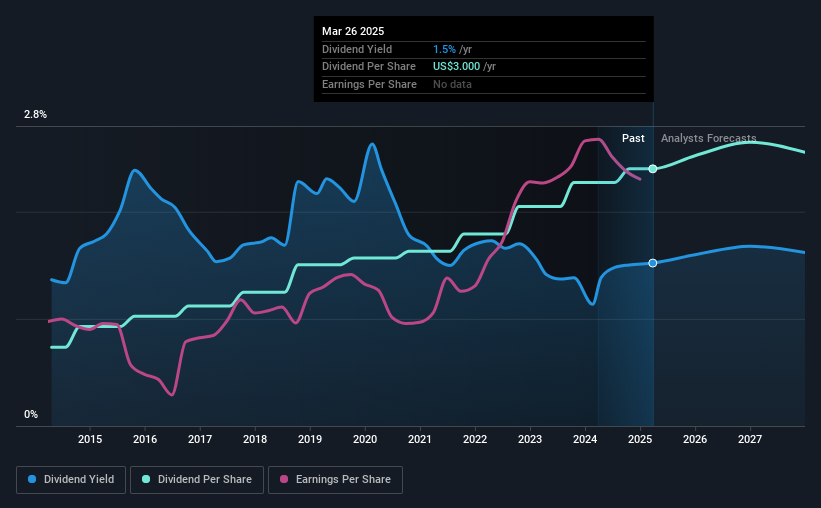Should You Buy Lincoln Electric Holdings, Inc. (NASDAQ:LECO) For Its Upcoming Dividend?
Lincoln Electric Holdings, Inc. (NASDAQ:LECO) is about to trade ex-dividend in the next 3 days. The ex-dividend date occurs one day before the record date, which is the day on which shareholders need to be on the company's books in order to receive a dividend. The ex-dividend date is of consequence because whenever a stock is bought or sold, the trade takes at least one business day to settle. Therefore, if you purchase Lincoln Electric Holdings' shares on or after the 31st of March, you won't be eligible to receive the dividend, when it is paid on the 15th of April.
The company's next dividend payment will be US$0.75 per share, and in the last 12 months, the company paid a total of US$3.00 per share. Based on the last year's worth of payments, Lincoln Electric Holdings stock has a trailing yield of around 1.5% on the current share price of US$197.26. Dividends are a major contributor to investment returns for long term holders, but only if the dividend continues to be paid. So we need to check whether the dividend payments are covered, and if earnings are growing.
Dividends are typically paid from company earnings. If a company pays more in dividends than it earned in profit, then the dividend could be unsustainable. That's why it's good to see Lincoln Electric Holdings paying out a modest 35% of its earnings. Yet cash flow is typically more important than profit for assessing dividend sustainability, so we should always check if the company generated enough cash to afford its dividend. Fortunately, it paid out only 34% of its free cash flow in the past year.
It's encouraging to see that the dividend is covered by both profit and cash flow. This generally suggests the dividend is sustainable, as long as earnings don't drop precipitously.
View our latest analysis for Lincoln Electric Holdings
Click here to see the company's payout ratio, plus analyst estimates of its future dividends.

Have Earnings And Dividends Been Growing?
Stocks in companies that generate sustainable earnings growth often make the best dividend prospects, as it is easier to lift the dividend when earnings are rising. Investors love dividends, so if earnings fall and the dividend is reduced, expect a stock to be sold off heavily at the same time. Fortunately for readers, Lincoln Electric Holdings's earnings per share have been growing at 12% a year for the past five years. Earnings per share have been growing rapidly and the company is retaining a majority of its earnings within the business. Fast-growing businesses that are reinvesting heavily are enticing from a dividend perspective, especially since they can often increase the payout ratio later.
The main way most investors will assess a company's dividend prospects is by checking the historical rate of dividend growth. In the past 10 years, Lincoln Electric Holdings has increased its dividend at approximately 13% a year on average. It's exciting to see that both earnings and dividends per share have grown rapidly over the past few years.
The Bottom Line
Should investors buy Lincoln Electric Holdings for the upcoming dividend? Lincoln Electric Holdings has been growing earnings at a rapid rate, and has a conservatively low payout ratio, implying that it is reinvesting heavily in its business; a sterling combination. There's a lot to like about Lincoln Electric Holdings, and we would prioritise taking a closer look at it.
While it's tempting to invest in Lincoln Electric Holdings for the dividends alone, you should always be mindful of the risks involved. Our analysis shows 1 warning sign for Lincoln Electric Holdings and you should be aware of it before buying any shares.
If you're in the market for strong dividend payers, we recommend checking our selection of top dividend stocks.
Have feedback on this article? Concerned about the content? Get in touch with us directly. Alternatively, email editorial-team (at) simplywallst.com.
This article by Simply Wall St is general in nature. We provide commentary based on historical data and analyst forecasts only using an unbiased methodology and our articles are not intended to be financial advice. It does not constitute a recommendation to buy or sell any stock, and does not take account of your objectives, or your financial situation. We aim to bring you long-term focused analysis driven by fundamental data. Note that our analysis may not factor in the latest price-sensitive company announcements or qualitative material. Simply Wall St has no position in any stocks mentioned.
 Wall Street Journal
Wall Street Journal